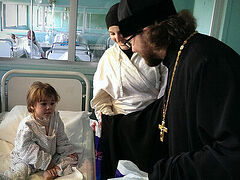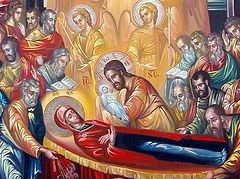Orthodox Christians on the Old Calendar recently began the Dormition Fast, preparing for the bright and joyous feast of the Dormition of the Theotokos. A correspondent of Pravoslavie.ru asked several clerics of the Russian Orthodox Church to give a brief word of consolation, edification, and encouragement to those who have entered in upon this fast, short but no less strict than Great Lent.
“The Dormition of the Mother of God is the Pascha of the Theotokos”
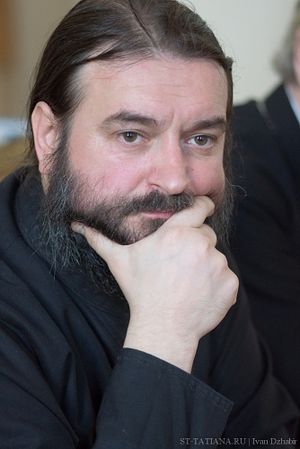 Fr. Andrei Tkachev. Photo: st-tatiana.ru I want people to understand for whom they are fasting. The Dormition of the Mother of God is the Pascha of the Theotokos, and the fast is preparation for this Theotokion Pascha. It is the celebration of her sleep as a mortal and her resurrection from the dead by her Son. Inasmuch as Rus’ loves the Mother of God and the Russian land is justly called the House of the Most Holy Theotokos, for the sake of the love of the Mother of God for us and of us for her, I would like to ask those who are fasting the whole fourteen days to do so in memory of the Most Holy, Most Pure, Blessed Virgin Mary and to offer their labor as a sacrifice to her, as far as they are able.
Fr. Andrei Tkachev. Photo: st-tatiana.ru I want people to understand for whom they are fasting. The Dormition of the Mother of God is the Pascha of the Theotokos, and the fast is preparation for this Theotokion Pascha. It is the celebration of her sleep as a mortal and her resurrection from the dead by her Son. Inasmuch as Rus’ loves the Mother of God and the Russian land is justly called the House of the Most Holy Theotokos, for the sake of the love of the Mother of God for us and of us for her, I would like to ask those who are fasting the whole fourteen days to do so in memory of the Most Holy, Most Pure, Blessed Virgin Mary and to offer their labor as a sacrifice to her, as far as they are able.
“How wonderful if, for the sake of the Mother of God, someone is able to depart from at least one sinful habit!”
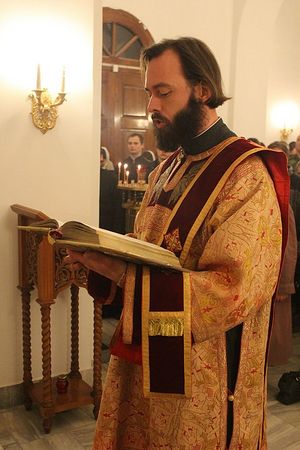 Fr. Valery Dukhanin as a deacon The Dormition Fast is a fast that Christians keep for the sake of the Mother of God. After all, it was on the feast of the Dormition that the Most Holy Virgin passed into the Heavenly world, becoming a protectress and intercessor for us all before God. It is to welcome this great feast that we fast.
Fr. Valery Dukhanin as a deacon The Dormition Fast is a fast that Christians keep for the sake of the Mother of God. After all, it was on the feast of the Dormition that the Most Holy Virgin passed into the Heavenly world, becoming a protectress and intercessor for us all before God. It is to welcome this great feast that we fast.
Usually we entreat the Most Holy Theotokos for various mercies, help, ever looking for her to cover and protect us. But what are we ourselves ready to do for the sake of the Mother of God? After all, genuine love is always expressed in some kind of sacrifice, in the fact that we don’t mind giving up something of ourselves for the sake of a loved one. What gift can we offer to the Most Holy Theotokos? She doesn’t need anything earthly, nor any earthly offerings, and that means our only gift to her is to offer our very selves. From this it follows that we must work on ourselves and cut out from our souls everything within us that is not pleasing to God. How wonderful if, for the sake of the Mother of God, someone is able to depart from at least one sinful habit! If only we could try to show at least some semblance of the humility and obedience to God that the Most Holy Virgin had!
Of course, fasting is always a time of repentance, and it’s no accident that the Dormition Fast is as strict as the Great Fast. Only, we have to make sure we understand repentance correctly. There’s a proverb: One man really wanted to thank God and prayed: “Lord, what can I give Thee?” And God answered him: “I need nothing. Everything that you have is already mine, for I gave it to you.” But the man insisted: “How can I thank Thee? What can I give Thee?” Then God answered: “If you love Me, then give Me your sins.”
Repentance isn’t the torturing of a man, but his cleansing from unnecessary, sinful accretions. It is man’s liberation from that which is not his, which is superfluous for him, which brings him only torment and hardship. If some extra load is tied to a balloon, it won’t float up into the sky. And so with man. In the Mystery of Confession, God takes away a man’s sins and burns them up, that he might be spiritually elevated.
Every time we enter upon fasting, we must remember that it’s a time of special repentance; that is, the liberation of the soul from the burden of sins. It is only with a pure soul that you can stand before the Heavenly Queen on the great feast of the Dormition.
At the same time, the Dormition Fast is a highly gratifying fast. It’s distinguished by its unique Church holidays and traditions. The first day of the Fast, August 1/14, is the Procession of the Precious Wood of the Life-Giving Cross. That is, we immediately turn to the Precious Cross as to the main spiritual weapon in our invisible battle. Honey is blessed on this day. That is, the Dormition Fast isn’t so bitter. On August 6/19, fruit is blessed in church, and that which is pleasing to the taste is combined with the invisible grace of God. The Lord shows mercy both to our souls and our bodies.
But the most important thing is that these are days when we truly have the chance to become closer to the Mother of God, to find peace for our restless souls under her gracious protection and to be accounted worthy to be partakers of the same Kingdom into which she ascended on the day of her blessed Dormition.
“A conscious spiritual life is the fully realized human life to which we are called”
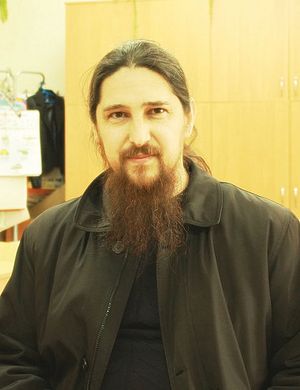 Fr. Dimitry Shishkin It may sound strange, but fasting, especially a multi-day fast, which we know about beforehand and count down the days leading up to, is, as far as I know, perceived by most Orthodox Christians not as a burdensome duty that must be endured “for obedience,” but as a happy opportunity to change, to transfigure our own lives. Because many of us feel, of course, that we are far not only from the ideal, but even from the rudiments of a truly Christian life. And realizing this, everyone wants to somehow gather themselves, become stricter with themselves at least for a time, because without such concentration, the spiritual life is wholly impossible, and there will remain only lamentations about it—which also aren’t bad, but are clearly not enough. And extended fasts give us such a wonderful opportunity. They move us, lazy and slack, to be more collected; they inspire us to a small but necessary work. Therefore, for the majority of conscious believers, fasting is a time that they desire and long for. And the secret of this expectation lies in that consciously encroaching upon our “carnal man” with all his “passions and lusts,” we begin to live differently. It’s difficult to put it into words, but it is this communion with another reality, with the reality of a real spiritual life that makes fasting desirable for many Christians who are wearied by their everyday and mundane enervation.
Fr. Dimitry Shishkin It may sound strange, but fasting, especially a multi-day fast, which we know about beforehand and count down the days leading up to, is, as far as I know, perceived by most Orthodox Christians not as a burdensome duty that must be endured “for obedience,” but as a happy opportunity to change, to transfigure our own lives. Because many of us feel, of course, that we are far not only from the ideal, but even from the rudiments of a truly Christian life. And realizing this, everyone wants to somehow gather themselves, become stricter with themselves at least for a time, because without such concentration, the spiritual life is wholly impossible, and there will remain only lamentations about it—which also aren’t bad, but are clearly not enough. And extended fasts give us such a wonderful opportunity. They move us, lazy and slack, to be more collected; they inspire us to a small but necessary work. Therefore, for the majority of conscious believers, fasting is a time that they desire and long for. And the secret of this expectation lies in that consciously encroaching upon our “carnal man” with all his “passions and lusts,” we begin to live differently. It’s difficult to put it into words, but it is this communion with another reality, with the reality of a real spiritual life that makes fasting desirable for many Christians who are wearied by their everyday and mundane enervation.
The Dormition Fast is considered a strict fast, but everyone can and should choose his own measure of strictness, because in the end, it’s not even important how you observed the various rules, but how much you personally labored and made an effort to draw nearer to God, to partake of His grace. This is the meaning of the fast. We can talk (conditionally, of course) about the “high” and “low” bars of strictness; however, these aren’t related to the assessment of a given person, but only to the strictness of abstinence he’s chosen. According to the monastic typikon, food is to be taken only once a day, save for feast days, and then not earlier than 3:00 in the afternoon. Moreover, xerophagy is called for, that is, food is to be eaten without adding any vegetable oil.
And the “low” bar, that is, the common and generally accepted rule for the laity, is abstaining from animal products. Everyone chooses for himself how often and how much to eat. However, obviously fasting isn’t just about food; it also requires abstaining from everything that hinders us in the spiritual life. And in our time, such obstacles are usually associated with the computer, with the TV, with all kinds of entertainment… By the way, this habit is so ingrained in our nature, even in the small things, that when we try to limit ourselves in many seemingly “innocuous,” but entertaining things that cause the soul to be lax, it becomes a very tangible difficulty—and, of course, a useful experience. So everyone has something to abstain from, if only we look at ourselves, at our lives, honestly and soberly, from a Christian point of view.
But abstinence is also not everything. As the Scriptures say: Depart from evil, and do good. So the fast is not just a time for abstinence from sin, but also for a more conscious and diligent than usual fulfillment of Christ’s commandments. This is a grace-filled and joyous work. And in this joy lies, I think, the main consolation that a man finds in fasting, in the joy of communion with another life, the life of Christ Himself. And what can be more joyful than this?! At first, when a man begins fasting, it’s as if he’s “broken:” a terrible mood, his fingers are all thumbs, his soul is depressed and bored… It’s our carnal man’s dissatisfaction with not being pandered to anymore, and inasmuch as it has already nearly completely mastered the soul, then the soul also languishes and suffers. But if the soul is still determined to continue fasting for Christ’s sake, seeking real renewal and communion with the grace of the Holy Spirit, then a different reality is soon revealed, and a truly different, and alas, little known to us life begins: a life in which the flesh continues to languish from the damage caused it, but this languor no longer dominates the soul, remaining as if in a subordinate state. But the soul opens up to a greater extent than usual to the influence of grace, and experientially comes to know the sweetness of repentance and prayer. Thus, man begins to live the very spiritual life to which he is called; but alas, he has lost an understanding of it due to his daily and complete immersion in the vanities of life.
The experience of fasting helps us understand that the conscious spiritual life is the truly normal and fully realized human life to which we’re called—a life filled with a special joy, incomprehensible without fasting and prayer; the joy of communion with God. So, Godspeed, and may the Lord bless us!


